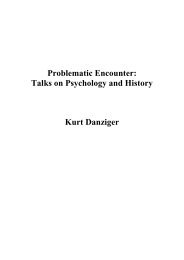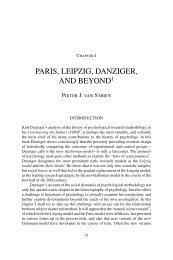The positivist repudiation of Wundt - Kurt Danziger
The positivist repudiation of Wundt - Kurt Danziger
The positivist repudiation of Wundt - Kurt Danziger
Create successful ePaper yourself
Turn your PDF publications into a flip-book with our unique Google optimized e-Paper software.
212 KURT DANZIGER<br />
<strong>The</strong> conflict that developed between <strong>Wundt</strong> and Kiilpe about the status <strong>of</strong> psy-<br />
chology as a natural science cannot be fully understood without noting an underlying<br />
divergence in their conception <strong>of</strong> the nature <strong>of</strong> science. Kiilpe had adopted from Mach<br />
and Avenarius what was subsequently to become known as the <strong>positivist</strong>ic conception <strong>of</strong><br />
science. According to this view, the fundamental task <strong>of</strong> science is observation and<br />
description, so as to provide the most economical summary <strong>of</strong> the relationships among<br />
experiences. Scientific theory is essentially a convenient summary <strong>of</strong> descriptions <strong>of</strong><br />
observations; scientific laws involve the establishment <strong>of</strong> functional relationships among<br />
observables. <strong>The</strong> emphasis on the principle <strong>of</strong> economy in the formulation <strong>of</strong> scientific<br />
generalizations, especially in the writings <strong>of</strong> Mach, leads to a particular stress on the u-<br />
nity <strong>of</strong> science-it is uneconomical to switch fundamental concepts when we switch fields<br />
and disciplines. Unity <strong>of</strong> scientific conceptualization can be achieved if as much use as<br />
possible is made <strong>of</strong> the most abstract generalizations. <strong>The</strong> sciences can be arranged in a<br />
hierarchy, according to the abstractness <strong>of</strong> their generalizations, physics being the most<br />
abstract and therefore the basis for the others. At each point in the hierarchy we attempt<br />
to describe observations <strong>of</strong> functional relationships in the most economical, that is, most<br />
abstract manner. <strong>The</strong> relationships dealt with by physiology being more general than<br />
those dealt with by psychology, the latter should be reduced to the former as far as<br />
possible.28<br />
<strong>Wundt</strong> recognized the close link between the concept <strong>of</strong> a hierarchy <strong>of</strong> sciences and<br />
<strong>positivist</strong> thought - he traced the concept to Comte and Herbert Spencer;29 further, he<br />
contrasted this concept with his own view according to which the relationship among the<br />
sciences involves a fundamental duality, expressed in the division, at one time used in<br />
England, between the natural and the moral sciences, or in the German division between<br />
Naturwissenschaji and Geisteswissenschaft. <strong>Wundt</strong> traced the origins <strong>of</strong> the German<br />
division to the Hegelian distinction between the philosophy <strong>of</strong> nature and the philosophy<br />
<strong>of</strong> spirit (Geist). What is involved here is the principle <strong>of</strong> the nonreducibility <strong>of</strong> the con-<br />
cepts <strong>of</strong> either set <strong>of</strong> sciences to those <strong>of</strong> the other set. <strong>The</strong>re are two ways <strong>of</strong> analyzing<br />
experience, according to <strong>Wundt</strong>; either we can analyze experience as it presents itself im-<br />
mediately, or we can analyze it mediately in terms <strong>of</strong> preconceived categories like<br />
momentum, force, energy, and so forth. <strong>The</strong> former is the path taken, not only by psy-<br />
chology, but by the Geisteswissenschajien in general; the latter is <strong>of</strong> course the approach<br />
characteristic <strong>of</strong> the natural sciences. This notion, that physical science is based on the<br />
prior construction <strong>of</strong> a conceptual network which imposes its own structure on ex-<br />
perience itself, is one which occurs very early in <strong>Wundt</strong>’s thinking.30 It is <strong>of</strong> course very<br />
much at variance with the <strong>positivist</strong> view <strong>of</strong> scientific concepts as economical descrip-<br />
tions <strong>of</strong> observed relationships; in the one case the stress is on the observational-<br />
descriptive character <strong>of</strong> science, in the other case it is its constructive-axiomatic<br />
character that is empha~ized.~~<br />
<strong>The</strong> opposing views about the relationship between scientific theory and observation<br />
are closely tied to diverging estimates <strong>of</strong> the role <strong>of</strong> experimentation in scientific psy-<br />
chology. As early as the original version <strong>of</strong> his Lectures on Human and Animal<br />
Psychology, <strong>Wundt</strong> had recognized limitations on the application <strong>of</strong> the experimental<br />
method to psychology: “Feeling and striving are too firmly enclosed by the boundaries <strong>of</strong><br />
the subject, their causes are generally hidden from objective investigation, so that the ex-<br />
periment no longer finds a place here.” 32 With the development <strong>of</strong> his characteristic<br />
philosophy <strong>of</strong> science <strong>Wundt</strong>’s estimate <strong>of</strong> the role <strong>of</strong> experimentation in psychology<br />
tended to become much less sanguine than it had been in his early works. Also, the basis





